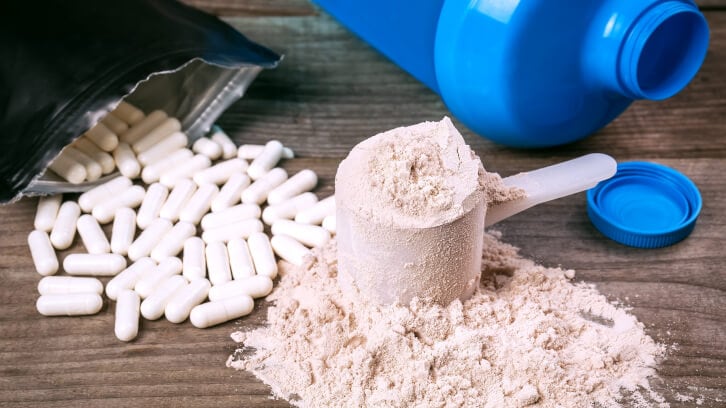In a consumer alert published April 2, Secretary of State Walter Mosley stated: “While it’s easy to assume that all health and wellness products on the shelves or purchased online are safe and effective, that’s not always the case, especially for dietary supplements.
“Supplements and vitamins may be beneficial for certain purposes and individuals, but consumers should always be cautious and do research before purchasing or taking these products,” he added.
According to the consumer alert, “dietary supplements are not required to be subjected to premarket testing, clinical trials and FDA approval in the same way that over the counter and prescription medications are and can be sold without the FDA ever knowing they are on the market.”
“Reports of labeling violations related to dietary supplements are common, and there have been reports of inclusion of potentially harmful ingredients, counterfeit and fake supplements sold online, and deceptive advertising and communication strategies by some companies,” it noted.
The full consumer alert can be read HERE.
‘Disappointing’
Daniel Fabricant, PhD, president and CEO of the Natural Products Association (NPA), called the NY Department of State’s alert “disappointing,” adding that the claim that dietary supplements are unregulated is “simply false, and top New York health officials should know better.”
“The FDA maintains a rigorous system to ensure that what’s on the label is in the product and that these products meet strict safety standards which includes a premarket nutritional process,” he said. “There are also severe fines, penalties and jail time for bad actors who break the rules, sell adulterated products or make false claims. I know because I used these authorities when I was the Director of Dietary Supplements for the FDA in the Obama Administration.”
“Millions of Americans safely use nutritional supplements each day as part of a balanced and healthy lifestyle,” he added. “If there were issues with the safety of our supplements supply, which is the safest in the world, we would know about them immediately. Vitamins and proper nutrition are far safer than the opioid crisis that has devastated our country and cut millions of lives short.”
Dr. Fabricant said that there are parts of the advisory that NPA agrees with, including the recommendation to consumers to consult with their healthcare professionals and being wary of suspicious online marketers making wild claims.
“But they should also be confident that America has the safest supply of natural products on the planet,” Dr. Fabricant said. “We call on the New York Department of State to retract or revise this misleading alert and provide accurate, science-based information regarding dietary supplements. Consumers deserve the truth—not fearmongering based on incomplete or inaccurate claims."
CRN: ‘New York gets so many of the facts wrong’
The Council for Responsible Nutrition (CRN) also said it agreed with some of the advice but added, “Once again, New York gets so many of the facts wrong and creates outsized public anxiety for dietary supplements, one of the safest categories of products regulated by FDA.”
CRN said the alert contained misinformation, including warnings of “potential risks” associated with supplements usage without corresponding recognition of their many health benefits and questioning the accuracy and legality of label claims that are both legal and well supported with competent and reliable scientific evidence.
“We agree that consumers should be savvy about making supplement purchases, especially if shopping online and considering products from sketchy websites. In fact, CRN offers similar Tips for Purchasing Dietary Supplements. We just do it with a lot less unnecessary fearmongering,” CRN said.
CHPA: Responsible manufacturers are committed to product safety and quality
Duffy MacKay, SVP of Dietary Supplements for the Consumer Healthcare Products Association (CHPA), said dietary supplements are regulated and consumers in New York and across the U.S., “can feel confident that responsible manufacturers are committed to product safety and quality and adhere to strict quality standards, which is why we always recommend consumers purchase from trusted, established brands.
“However, outdated regulations enable bad actors to exploit the system and consumers,” he said. “Federal reform of dietary supplements is crucial to maintain consumer trust and industry credibility; without it, we risk a fragmented patchwork of state regulations that could compromise product safety and efficacy.
“That’s why CHPA is a leading advocate for regulatory modernization, which will provide FDA with the tools it needs to safeguard consumers and efficiently remove illegal products from the marketplace through Mandatory Product Listing, increased cGMP inspections, and other reforms that will enhance transparency, safety, and innovation.
“CHPA echoes Secretary Mosley’s reminder for consumers to be informed shoppers and will continue our fight against adulterated, counterfeit, and stolen goods. As a member of the SHOP SAFE Coalition, CHPA advocates for policies that support consumer protection and marketplace integrity.
Dr. MacKay added that CHPA supported the INFORM Consumers Act (now law) and the SHOP SAFE Act of 2024, and is working with state Attorneys General to tackle counterfeit risks in online healthcare purchases.
“Additionally, our Health In Hand Foundation continually works to empower consumers to make informed self-care decisions when purchasing supplements through educational tools and resources that help them understand how to buy responsibly, how to read a supplement facts label, how to spot red flags, and how to spot counterfeit products," he said.
History
This is not the first time the Empire State has issued consumer alerts around dietary supplements. In 2022, it alerted consumers about “the myriad of fraudulent [dietary supplement] products” marketed for weight loss.
New York Governor Kathy Hochul also signed a law in 2023 that prohibits the sale of weight loss or muscle building supplements to minors. The law came into effect in April 2024. Similar bills have been introduced in several other states.





